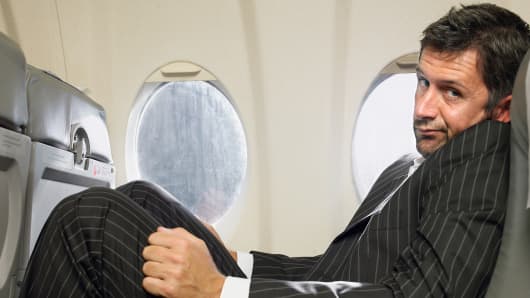
A seat upgrade on a flight will make you dance all the way from the check-in desk to your seat, but a getting downgraded on a flight feels like your lottery winning ticket has just been snatched from your hand.
It’s crushing in every way imaginable. Airlines overbook as a matter of course, based on the well-proven fact that there will be a few who fail to show up for the flight they’re booked on. If the economy class cabin is overbooked, some of those passengers will be offloaded to another flight. If that happens with premium economy or business class, some passengers will be downgraded to the next lower class – although airlines tend not to overbook their premium classes. However it can happen – for example if a smaller aircraft with fewer premium seats is substituted for a larger one.
Nobody is immune from business class downgrades. Doesn’t matter if you’re a 210cm NBA basketball player forced to squish into an economy seat – Festus Ezeli, Air Alaska, 2019 – or an actor with Harry Potter credentials – Matthew Lewis, Air Canada,2022 – if the cabin is full, fame or physical dimensions are not going to swing things your way. A relation was once downgraded from a business class seat aboard an Australian airline when a heavyweight federal politician showed up, although the airline made amends.

There’s a priority list that determines who gets bumped. Leading candidates for a downgrade are those who have paid for their flight using points, or points plus pay. Compensation for their downgrade will most likely be in the form of points, at zero monetary cost to the airline. Whereas if the airline benches a fare-paying passenger, they might have to compensate with cash. After those, the airline will usually look to protect its most valued customers. Elite level flyers with platinum or equivalent membership of the frequent flyer program are the least likely to be sent to the back of the aircraft, those further down the status ladder are vulnerable.

What are your rights?
In most cases it’s the airline that decides the outcome in the event of a downgrade, but if it happens on a flight bound for or originating in Europe, that’s different. In Europe flyers’ rights are enshrined in law, and that law says passengers who are downgraded are entitled to a refund of the original ticket price. For a flight less than 1500 kilometres the refund is 30 per cent of the original ticket price, 50 per cent for a flight between 1500-3500 kilometres and 75 per cent for a flight over 3500 kilometres. To be repaid within seven days. When my daughter was downgraded from business on a Swissair flight from Dubai to Zurich she was instantly given a debit card loaded with 1200 Swiss francs ($1800) plus a refund of the difference as stipulated under EU law.
If a downgrade happens just about anywhere else the airline determines whatever compensation applies according to its own terms and conditions. In the case of a downgrade from business or premium economy, typically the airline will refund the difference between the price you’ve paid and the price of the seat you ended up in, but there’s a catch.
Rather than the difference between what you paid and the price of an economy ticket on the day the booking was made, some airlines apply the price that would have been paid on the day of the flight, and that’s going to be the most expensive economy ticket you can buy. It will probably be the full flexy fare, again the most expensive type of economy class fare. The upshot is a far lesser payout for the airline.
If that happens in Australia and you’re not happy with the response from the airline’s customer care, your only recourse is to the Airline Consumer Advocate, a body established by and funded by the airlines, and guess whose side they’re on?

If you’re shuffled from business to economy, an involuntary downgrade in airline parlance. you may even be better off refusing to fly if you have the option to delay your trip. According to Qantas’ Conditions of Carriage “You will be entitled to a refund if we downgrade you from the class paid for.” The conditions also state, “the refund will be equal to the fare paid, if no part of the Ticket is used”. If the downgrade happens on the first leg of a return journey, you should therefore be entitled to a full refund.
Are downgrades more likely now?
Perceptions vary, but overall, international flights are about as crowded as they were before the pandemic, and therefore downgrades are not likely due to oversold seats. According to the Bureau of Infrastructure and Transport Research Economics, overall seat utilisation on international flights to and from Australia stood at 82.8 per cent in June 2022, against 80.7 per cent in June 2019. That’s a small enough change to suggest that you’re only fractionally more likely to be downgraded on an international flight today compared with before the pandemic.
How to beat the downgrade
Flyers who travel frequently and demonstrate their affection for one airline are least likely to be downgraded, particularly on flights where they’re paying with cash. Another tip – fly on days when cabins are less likely to be full, generally between Tuesday and Thursday. Some flyers suggest showing up early at the airport. If you’re in a category tagged for a potential downgrade, it’s first in, best dressed.








